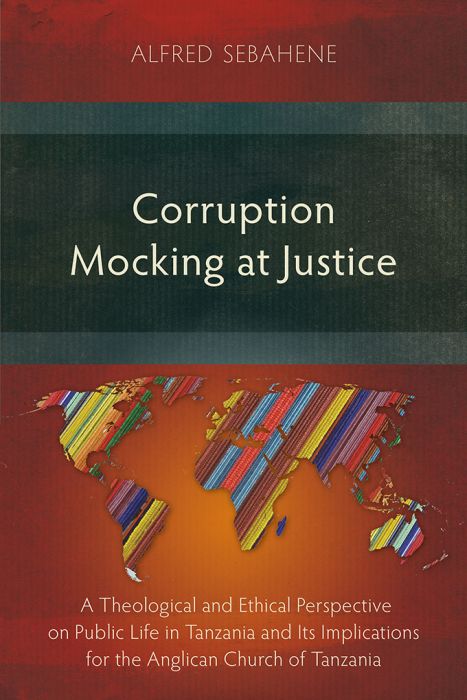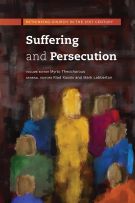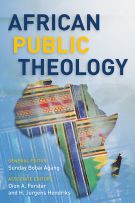| ISBN: | 9781783683345 |
|---|---|
| Imprint: | Langham Academic |
| Format: | Paperback |
| Dimensions (mm): | 229 x 152 x 19 |
| Publication Date: | 30/09/2017 |
| Pages: | 354 |
| Series: | Studies in Public Theology |
| Language: | English |

Corruption Mocking at Justice
A Theological and Ethical Perspective on Public Life in Tanzania and Its Implications for the Anglican Church of Tanzania
The church has a duty to fight corruption and injustice. The increased awareness globally of corruption and the threat it poses to humanity has led many in the secular and Christian world to seek solutions to stamp out this scourge. Recognizing the crisis caused by corruption in Tanzania, his own country, Dr Alfred Sebahene seeks to understand this social epidemic through the application of theological ethics. As a result of the study the author identifies theological-ethical guidelines that inform and add substance to the church’s duty in the public sphere, particularly in the fight against corruption and injustice.
Endorsements
This work will generate needed discussion and subsequent action against corruption and injustice. I commend Dr Sebahene for an excellent piece on two interlinked critical contemporary social and spiritual issues and recommend his work to anyone desiring to contribute to the war against corruption and injustice.
Professor Emmanuel D. Mbennah, PhD
Vice-Chancellor,
St John’s University of Tanzania
Not only a necessary and timeous study, but a work that can serve the discourse on corruption and the role of churches across Africa well.
Len Hansen, DTh
Director of Research Development, Stellenbosch University
Executive Director, NetACT Africa
Dr Sebahene explains in some detail how corruption is manifested, and outlines its devastating effects on the people of Tanzania. This book will also be of value to members of other countries, especially in Africa, who wish to understand why corruption has increased and what can be done to oppose this personal temptation and social scourge.
Louise Kretzschmar, PhD
Professor of Theological Ethics, University of South Africa
Table of Contents
- Abstract
- Opsomming
- Acknowledgements
- Chapter 1
- Introduction
- 1.1 Background to and Motivation for the Study
- 1.2 Primary and Secondary Research Questions
- 1.3 Research Design, Methodology and Overview of Primary (Literary) Sources
- 1.4 Possible Contribution of the Research
- 1.5 Structure of the Study
- Corruption, Injustice and Contemporary Public Life in Tanzania
- 2.1 Introduction
- 2.2 Corruption and Justice/Injustice – A Conceptual Analysis
- 2.3 Corruption in Tanzania – A Historical and Contextual Analysis
- 2.4 Corruption: Causes and Consequences
- 2.5 Conclusion: Corruption and Corruption as Injustice in Contemporary Tanzania
- Why Corruption? Biblical and Theological-Ethical Considerations of the Nature of Corruption and In/Justice and Corruption as Justice
- 3.1 Introduction
- 3.2 Point of Departure: The Unique Nature of Biblical-Ethical Principles on Corruption and In/Justice
- 3.3 Forms of Corruption and Injustice in the Bible: A Short Overview
- 3.4 On the Character of God: A Methodological Route towards Theological-Ethical Principles
- 3.5 Preliminary Conclusion: God, In/Justice and Corruption from a Biblical-Theological Perspective
- 3.6 On the Nature of Humankind: Christian Anthropological Perspectives in the Context of Corruption and Injustice
- 3.7 Conclusion
- Why the Church . . . and How? The Public Role of the Church in the Context of Corruption
- 4.1 Introduction
- 4.2 Point of Departure: What Is “The Church”?
- 4.3 The Fight against Corruption: Why the Church?
- 4.4 The Church in the Fight against Corruption – How?
- 4.5 Conclusion
- The Anglican Church of Tanzania and Its Response to Corruption
- 5.1 Introduction
- 5.2 The Anglican Communion and the Origins of Anglican Church of Tanzania
- 5.3 The Church’s Engagement in Public Life: The UMCA and CMS Missionary Methods
- 5.4 Reflections on Anglican Theology, Identity and Spirituality
- 5.5 The Anglican Church of Tanzania’s Public Witness in the Context of Church-State Relations
- 5.6 ACT’s Anti-Corruption Efforts
- 5.7 ACT’s Anti-Corruption and the Discourse on Justice: A Failure or Success?
- 5.8 A Final Word: Appreciating a Societal and Political Context Conducive to an Anti-Corruption Public Role
- 5.9 Conclusion
- Summary, Conclusion and Recommendations
- 6.1 Introduction
- 6.2 Summary of Arguments and Research Findings
- 6.3 Recommendations
- 6.4 Concluding Words








